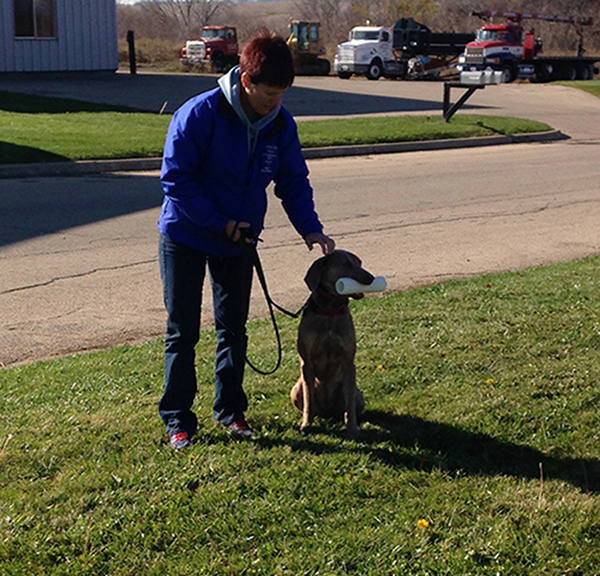Teaching a Dog to Retrieve: A Rewarding Skill to Practice
Teaching a dog to retrieve is one of the most rewarding skills you can work on. I’m not talking about the game of chasing a ball and bringing it back to you. While that is certainly a fun activity and good exercise for your dog, I am speaking to the task of deliberately retrieving specific items and delivering them into your hand.
Many dogs will chase and pick up something like a ball or toy that we toss for them, but few can be directed to pick up the car keys or remote for the television and bring it to us.
The difference between chasing and grabbing a toy that is moving (which stimulates prey drive) and picking up an object that is still and possibly undesirable, like metal is significant.
Teaching a dog to retrieve is not an easy task, and I do my best to prepare those who sign up for my retrieve workshop to understand that it will likely be the most challenging skill they teach their dog.
However, it will also be the most rewarding.
It is rewarding for several reasons, the obvious being that you will have a great helper around the house! My dogs perform all sorts of little tasks on a daily basis that make life with some physical limitations a whole lot easier. My dogs retrieve my shoes (insert Video of Shoe Retrieve) and pick up things that I’ve dropped, like my keys or a pencil. They can help me carry groceries to the house and can hold their own leashes when I have to stop to tie my shoe.
The flip side of my appreciation for their help is that the dogs LOVE having a job to perform. I believe it builds a sense of accomplishment in them. The tails wag furiously when they deliver some prize to me. They love it so much they will compete to be first to the item if I am not explicit in WHO is supposed to get the retrieve. A dog that has a “job” to perform on a routine basis is far less stressed by boredom and more fulfilled with daily life.
The other, but subtler, outcome of teaching a trained retrieve is what it does to enhance the relationship between dog and dog owner. Going through this training process will bring to light gaps that exist in how well we understand our dogs behavior. Teaching the retrieve will improve a handler’s ability to know the difference between the dog being confused about the desired task and the dog flat out refusing. That is a key piece of knowledge that anyone wanting to enhance the human-canine relationship through training must learn.
The difference my retrieve workshop has from other forced retrieve methods is that we work from beginning to end using the e-collar. From the start, it is a pressure on, pressure off guidance system that builds clarity in the dogs mind and does not require any significant discomfort to the dog to learn to hold, carry, open the mouth or go out. It is still a “forced” retrieve process but surprisingly gentle on the dog in comparison to other forced methods. So much so, that I can teach in a group format, and my audiences are primarily pet owners, rather than professional trainers.
Intriguing huh? ☺
Enjoy the photos and videos from the most recent weekend workshop and if you are interested in learning more join my email list for announcements of upcoming seminars.

Yes, agreed. And its so much fun when they retrieve and dropt the ball for you again and continue to play. Thats what having a dog is all about!
Robin–thank you! Working on this now with “pup” (9 months old)